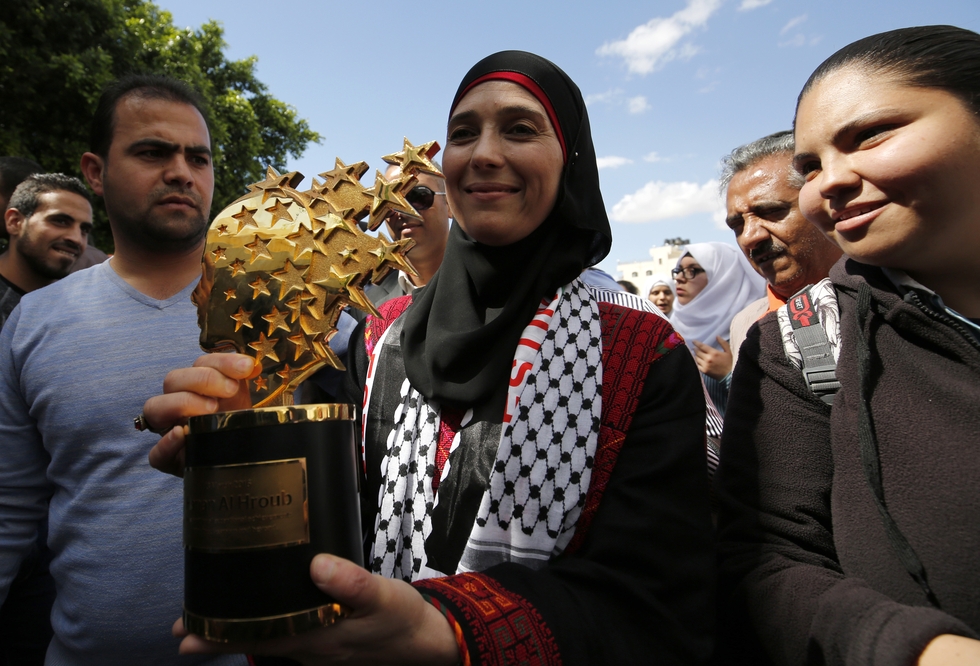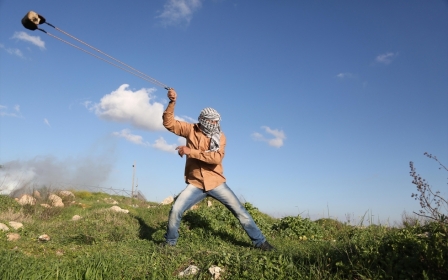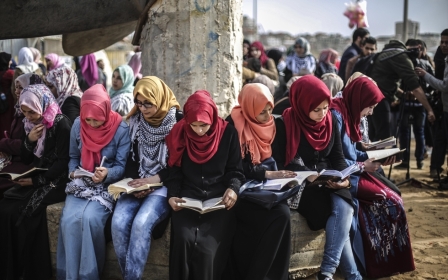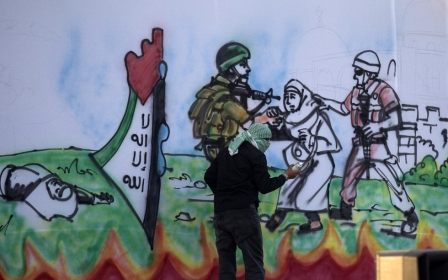Hanan al-Hroub is a shining beacon for Palestine

Hanan al-Hroub was handed the second annual global teacher prize at a star-studded ceremony in Dubai on 13 March. Announcing the name of the prize winner, Pope Francis said “Part of education is to teach children how to play.” He congratulated al-Hroub for winning the prize “due to the importance she gave to the role of play in a child’s education”.
Accepting her award, al-Hroub said: “I am proud to be a Palestinian female teacher standing on this stage. I accept this as a win for all teachers in general and Palestinian teachers in particular.” The pride that she brought to a whole nation still fighting for its legitimate rights could be felt not only back in the occupied territories but in the Palestinian refugee camps and the rest of the diaspora.
The announcement was greeted with loud cheers and the waving of Palestinian flags in the hall but also with joyous celebrations among Palestinians the world over.
The last time this unity in celebration among Palestinians everywhere was seen on this scale was when the now famous Palestinians singer Mohammed Assaf won Arab Idol back in 2013. Assaf and al-Hroub share not only being winners but also originating from Palestinian refugee camps in Gaza and the West Bank respectively. Both grew up under Israel’s military occupation and witnessed its violence first hand.
Assaf almost missed the opportunity to audition for the Arab Idol programme due to the siege on Gaza. Following his win, Assaf was named a goodwill ambassador for peace by the United Nations Relief and Works Agency for Palestine Refugees (UNRWA). Palestinian President Mahmood Abbas also named him ambassador of culture and arts.
Al-Hroub’s work which led to her global award demonstrates that despite the extremely difficult conditions under which Palestinians grow up, there is a determination to excel in their lines of work and to seek non-violent means to contribute to the development of their society. Al-Hroub’s approach to dealing with children that have either experienced violence themselves or witnessed it first hand - as her own children had - is detailed in her book We Play to Learn.
It is reported that the trigger for her work was her children’s experience of a shooting incident. The work led to her developing interventions to help children cope with their experiences and to say "no to violence". Al-Hroub believes in “developing trusting, respectful, honest and affectionate relationships with her students and emphasises the importance of literacy. She encourages her students to work together, pays close attention to individual needs and rewards positive behaviour."
Her biography confirms that her approach has “led to a decline in violent behaviour in schools where this is usually a frequent occurrence; she has inspired her colleagues to review the way they teach, their classroom management strategies and the sanctions they use.”
The struggle for normality
It was rather timely that the announcement of al-Hroub’s award was made as the strike by Palestinian teachers came to an end. Both brought joy to the beleaguered Palestinian people battling to live anything like a normal life free from Israeli violence, restrictions on movement, ever expanding settlements and settler violence.
Teachers and children wake up in the morning with the uncertainty and the insecurity of not knowing whether this is to be a normal day, whether they will be able to make it to school and in some cases whether their school will be there when they get to it.
The recent example of the demolition of the Abu-Nawwar Primary School in occupied Jerusalem is but one example of the trauma Israeli policies inflict on children. Other examples include the daily terror that children face from illegal settlers on the school walk in parts of Hebron, which necessitate accompaniment by international volunteers. The IDF has also been known to fire gas canisters in the direction of children on their way to school and into schools. A recent report accused Israeli soldiers tossing a stun grenade into another school in the West Bank.
In Gaza, children have seen friends die next to them in school under fire from Israeli soldiers and during the major wars on the strip, including that in 2014, witnessed deaths of relatives, loved ones and friends. However, despite this and the regular "study by candle light" due to the lack of electricity and abject poverty as a result of the siege, the resilience of the children and their teachers is admirable.
They continue to pursue the highest levels of education both at home and, when permitted, abroad and continue to excel. In 2013 14-year-old Palestine refugee Areej El Madhoun, a student at UNRWA’s school in Jabalia camp, received the first prize in in the Intelligent Mental-Arithmetic Competition, held in Malaysia every two years.
It was rather ironic that in the audience that saw al-Hroub receive her award in Dubai was the former Middle East Envoy and former British Prime Minister Tony Blair, a man known for coining the phrase “Education, education, education” to indicate that this would be a key priority for his government. It is rather sad that his tenure as envoy saw the situation for Palestinians, especially children, worsen rather than improve.
The situation is particularly desperate in the areas designated "C" under the Oslo Accords which Israel administers and effectively bars any development of schools to cater for the children, including building any additional class rooms or facilities without planning permission which is almost always refused.
The 13th of March was about a Palestinian teacher excelling and being recognised for so doing on the international stage. The Palestinians see this as a major achievement for her and for them and all celebrated this in style. One can look forward to the day when Palestine is free, allowing the Palestinians to bring their talents to helping others and to tackling the world’s challenges. They will undoubtedly win many more awards.
- Kamel Hawwash is a British/Palestinian engineering professor based at the University of Birmingham and a long-standing campaigner for justice, especially for the Palestinian people. He is Vice Chair of the Palestine Solidarity Campaign (PSC) and appears regularly in the media as commentator on Middle East issues. He runs a blog at www.kamelhawwash.com. He writes here in a personal capacity.
The views expressed in this article belong to the author and do not necessarily reflect the editorial policy of Middle East Eye.
Photo: Hanan Al-Hroub (C), a Palestinian teacher who won the Global Teacher award, poses with her trophy during a public reception upon her arrival in the West Bank city of Jericho from Jordan on 16 March, 2016 (AFP).
Middle East Eye propose une couverture et une analyse indépendantes et incomparables du Moyen-Orient, de l’Afrique du Nord et d’autres régions du monde. Pour en savoir plus sur la reprise de ce contenu et les frais qui s’appliquent, veuillez remplir ce formulaire [en anglais]. Pour en savoir plus sur MEE, cliquez ici [en anglais].





